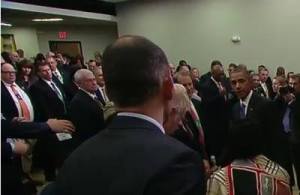I got invited to the White House yesterday. No kidding. I was sitting at dinner with some colleagues and students at McDonogh, and I got a message on my phone from President Obama’s Director of Presidential Correspondence asking if I’d be interested in attending the Criminal Justice Reform panel he and The Marshall Project were holding.
I said no.
That’s a lie, of course. I was ready to head down to DC last night, for crying out loud!
But why would a high school teacher get this phone call? Well, this past summer, I learned about the President’s wish to examine and reform the criminal justice system in the United States. He gave a speech at the NAACP, and I admired his wish to understand why, since 1980, the prison population in the U.S. has increased from under 500,000 inmates to roughly 2.2 million people in our day. And those who are incarcerated are disproportionately represented by black and Latino men. Add to this the fact that our current prison profile costs taxpayers around $80 billion, and you can see why this is a priority. For more on the history of corrections in the U.S. during this period, see Ta Nehisi Coates’s, “The Black Family in the Age of Mass Incarceration,” The Atlantic‘s featured article in its October issue.
President Obama’s call for reform also comes hard on the heels of Michael Brown, Eric Garner, and Freddie Gray. And, as he said today, while most law enforcement have the best of intentions in the midst of often very dangerous work, we cannot ignore that black men and boys seem singled out in exceptional ways, historically.
But why me? Well, in the past year, I have grown increasingly dissatisfied with my own ignorance about the problems with racism in this country and with the ways I benefit from structural bias day-to-day. If I’m a teacher with intentions of helping students prepare for life, I have a deep obligation to own my ignorance and to do something about it. Without question, the events in Ferguson, Staten Island, and Baltimore opened my eyes. I didn’t only want to learn; I wanted to do something, too. Freddie Gray, I thought, could easily have been any number of young men in my classroom.
And so I started to read, watch, and discuss. I filled in gaps in my understanding of Civil Rights. I read Coates’s, Between the World and Me. Our school read Beverly Daniel Tatum’s book, “Why Are All the Black Kids Sitting Together in the Cafeteria?” I learned about Freedom Summer. I devoured Ralph Ellison’s, Invisible Man. You get the picture.
I was also working with McDonogh’s Director of Diversity to help pen the School’s Diversity Strategic Plan. I was immersed in the conversation about diversity and, in particular, about race and racism in the United States. I’m not too proud of the fact that, as a 46-year-old, I had so many gaps (and continue to have them), but I own that truth, and I want to do something about it.
And, so, when I heard the President’s platform, I did something I never thought I’d do: I wrote him a letter. To cut to the chase, I thanked him for his work on this issue and I offered to serve on an advisory board if education was to be part of this reform (which it is).
Time passed. School started. The leaves turned yellow and red.
And then the phone call came: “The President read your letter, marked it up, and passed it around to some of his team. He thought you might like to attend this panel.”
But why did I think I had (have) anything to offer? First, I have had the privilege to know people in the Shakespeare theatre world who have done remarkable work with prison populations. Curt Tofteland, whom I cited in my letter to Mr. Obama, founded the rightly famous, Shakespeare Behind Bars program. Now in its 21st year, SBB has had a significant impact on parts of the population that the rest of us would soon like to forget. And I get that. Many of the people who are in prison are, to be sure, guilty of their crimes — some actions that are too awful to name. But with the major majority of inmates scheduled for release, how prepared are they for re-entry? Will they be released ready for the challenges of life (especially when carrying the stigma of a felony), or will they be stripped of these life skills and, sooner than later, add to the recidivism numbers? SBB has proven that arts programs — indeed, all education — help to create a population of people more ready to be contributing citizens. The work of Curt Tofteland and many others who have followed in his steps inspired me, and I knew that I could count on that Shakespeare community to contribute to any expansion of such programming.

President Barack Obama and LAPD Police Chief Charlie Beck
I also wrote because I have been a classroom teacher for nearly 25 years, and, in that time, I think I have come to know what is at the very core of every teacher’s job: to help students find their meaning. Yes, we prepare them for college and jobs, but, in the end, they’d get into college and find jobs without much help from us. The greatest joy and the greatest calling of being a teacher is to clear a path so that a student turns down that path toward the thing that becomes the first thing they think of in the morning and the last thing they see in their mind’s eye at night.
I’ve had the privilege to see students who thought little of the stage in the 9th grade enroll as conservatory students in acting after high school. And I know this happens in math, English, music, visual art, science, world language, and history all the time.
Sometimes, when I hear about gang members in Baltimore or about people leaving their countries to join ISIS, I think, “they’re looking for their meaning.” And, as tragic as it might be, they probably find it there on some level. And then I think, “If they only had a drama program or a lacrosse team or violin, what might be different?”
I’m not naive. I know having a role in Hamlet won’t transform everyone. No, not everyone. But some? Yes. Many? Yes. I say yes. And I believe that the many people in prisons and those most at risk for being sent to one are there — or will be — because, at some point, they were denied more positive ways to find their meaning.
And that’s why I wrote President Obama. And that’s why I teach and will continue to teach. And that’s why I think it’s important that I tell you about it.


What a great post Kevin! You’re a good man! Sounds like an amazing experience.
LikeLike
Congratulations, Kevin, and thanks for sharing your story! It reminds me of one of my former alternative school students who served some time in prison. He wrote to me to see if I could send him some Shakespeare since all the books were checked out of the prison library!
LikeLike
Wow Kevin! Your stories have changed since we use to “hang out.” Congratulations! But, please never lose your wonderful sense of humor. And, please, keep them coming. ❤️
LikeLike
Yummy.
LikeLike
This is such an honor, Kevin. What a way to use your gift to make a difference.
LikeLike
This is inspirational and, knowing you, in unsurprising. The District could use a good dose of Costa and your informed, passionate teaching. Congrats, and wonderful post.
LikeLike
This is inspirational and, knowing you, is unsurprising. The District could use a good dose of Costa and your informed, passionate teaching. Congrats, and wonderful post.
LikeLike
Awesome job! Good luck on the meeting with POTUS, too. One question regarding the $80million dollar figure — where does that number come from? The most widely-cited figure for taxpayer cost of prisons appears to be a 2010 study covering 40 states, putting the figure for taxpayer costs to just those 40 states at $38 billion/year (see http://www.vera.org/pubs/special/price-prisons-what-incarceration-costs-taxpayers). Maybe the number you mean is $80 billion? In either case, you are raising great points and I wish you well on your WH visit.
LikeLike
It is $8 billion — my mistake!
LikeLike